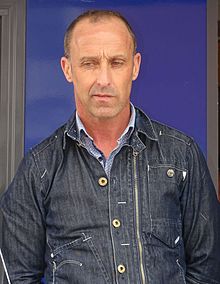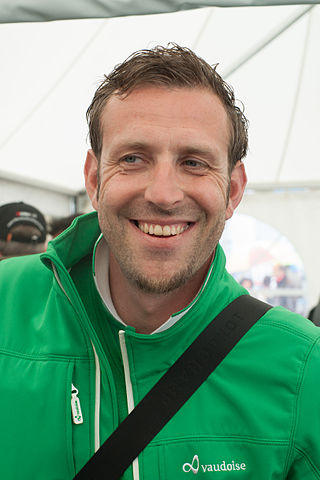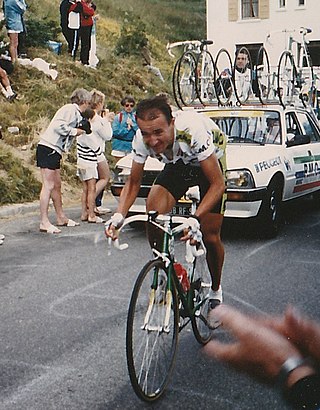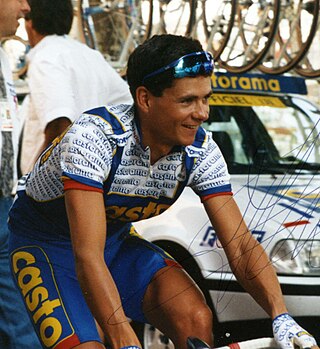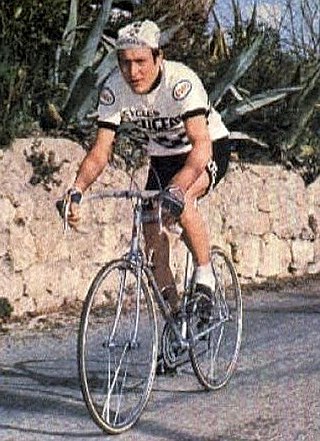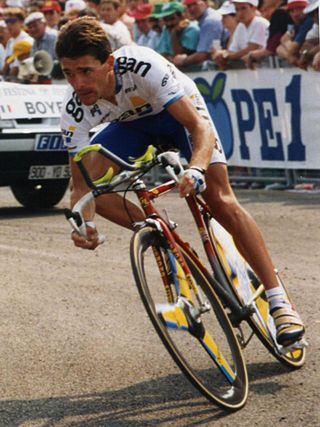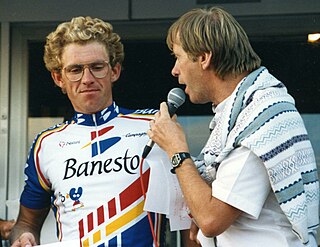Biography
In 1978, a drunk driver hit Luc Leblanc, aged 11, and his younger brother Gilles Leblanc, aged 8. Gilles died after the accident, and Luc was hospitalized for six months. After many operations, Luc was able to walk again, although his left leg was 3 cm shorter and weaker than his right leg. [1]
Initially, Leblanc wanted to become a priest, but after a physiotherapist's advice to take up cycling to solve his leg problems, and subsequently Raymond Poulidor's advice to become a professional cyclist, he did not become a priest. [2]
At the 1991 Tour de France, in the 12th stage Leblanc joined the decisive attack together with Charly Mottet and Pascal Richard. Mottet won the stage, but they finished 7 minutes ahead of the classification leader LeMond, which meant that Leblanc was the new leader. [3] The next day, Leblanc finished 12 minutes behind the winner, and lost the lead to Miguel Induráin, who would remain the leader until the end of the race. [4]
The yellow jersey that he received for leading the general classification, he gave to Poulidor. [2] His accident years earlier did lead to operations on his injuries, and in the 1992 Tour de France the effects caught up with him and he had to stop on the stage to Alpe d'Huez. Again, in 1993, his legs hurt, nothing worked, and Luc Leblanc wanted to end his cycling career. However, the last thing he decided to try was to switch to teams and he joined the Festina team. [2]
The next year, 1994, was his most successful year. At Festina, Leblanc won the 11th stage of the 1994 Tour de France ahead of Pantani and Indurain, and in the 1994 Vuelta a España he won the mountains classification. Later that year he won the 1994 UCI Road World Championships. [2]
As a world champion, Leblanc had many offers from the world's best cycling teams. He joined Le Groupement, but the team's sponsorship ended one week before the 1995 Tour de France. Leblanc moved on to the Italian team Polti. Here, needing operations on his leg again, the results were not as expected, although he won one stage at the 1996 Tour de France. [2]
In 1999, Leblanc was fired by Polti, because Leblanc was injured and could not continue his career. [5] Later, the Italian court decided that the dismissal was unfair, and Polti should pay Leblanc. In 2007, Leblanc sued the French and Italian cycling authorities and the UCI because he still had not gotten the money. [6]
In 2004, Leblanc became team captain for Chocolade Jacques in 2004. [7]
Later, Leblanc became a consultant for a French radio station Radio Monte Carlo during the Tour de France. [8]
